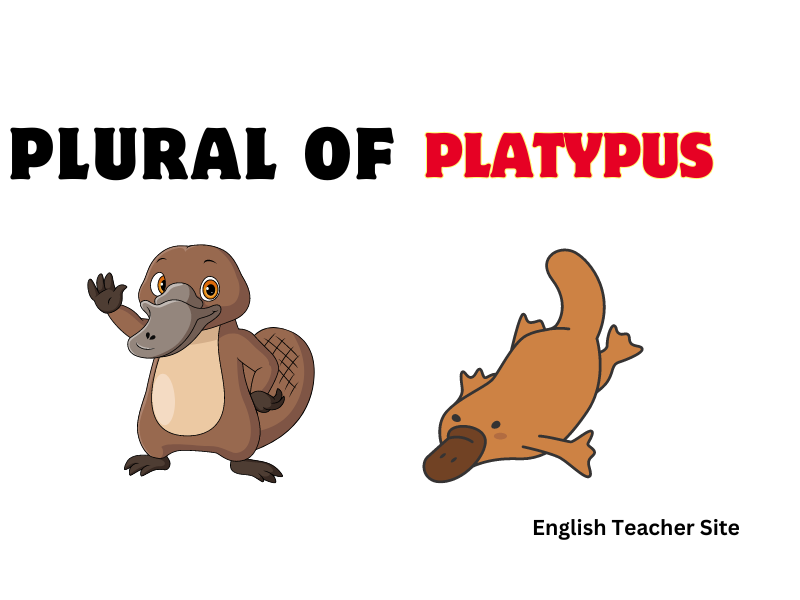What’s the Plural of Platypus: Understanding English Nomenclature

- “Platypuses” is the correct plural form of “platypus,” adhering to standard English grammar rules.
- The term “platypi,” though commonly used, is incorrect due to the word’s Greek origins, not Latin.
- Understanding the proper plural form is important for clear communication and grammatical precision.
Despite a common misconception, “platypi” is not the correct plural form. This arises from a mistaken application of Latin rules to a word of Greek origin. In fact, using Greek linguistic rules, the term would be “platypodes,” which is correct but infrequently used. The use of “platypuses” remains the standard, particularly in scientific and common English usage. The plural form of the word is essential not just for grammatical accuracy but also for clear communication in both written and spoken contexts.
What’s the Plural of “Platypus”?
Platypuses is the most widely accepted plural form. It adheres to the standard rule of adding -es to nouns ending in -s.
However, some might be tempted to use “platypi,” imitating the way certain Latin words are pluralized. This is incorrect since “platypus” does not have Latin origins.
The tables below highlight the acceptable and commonly mistaken plural forms of “platypus”:
Acceptable Plural Form:
| Singular | Plural |
|---|---|
| Platypus | Platypuses |
Commonly Mistaken Plural Form:
| Incorrect Plural | Reason for Mistake |
|---|---|
| Platypi | Erroneous application of Latin rules to a Greek-derived word |
In written and spoken English, the use of “platypuses” conforms to the conventions of pluralization. Consider the following examples:
- A group of platypuses was spotted by the riverbank.
- Platypuses are known for their distinctive physical features and behaviors.
What’s the Singular of “Platypus”?
The singular term used is “platypus.” This distinct name is appropriate for a unique semiaquatic mammal found in eastern Australia, including Tasmania.
The term “platypus” itself is derived from Greek origins:
- platy- meaning “flat”
- -pus referring to “foot”
| Singular | Description |
|---|---|
| Platypus | Refers to one individual of the species Ornithorhynchus anatinus. |
Rules for using the singular “platypus” include:
- Subject-verb agreement: Ensure that verbs agree with the singular noun “platypus”.
- Articles: Use appropriate articles such as “a” or “the” before “platypus” depending on the context.
Example sentences:
- A platypus resides in the streams of Tasmania.
- The platypus has a bill like a duck’s.
Defining “Platypus”
A platypus (Ornithorhynchus anatinus) is an intriguing semiaquatic mammal endemic to eastern Australia, including Tasmania. Unique among mammals, the platypus showcases a remarkable blend of traits: it lays eggs, possesses a duck-like bill, webbed feet, and dense waterproof fur. This monotreme is also equipped with electroreceptors, enabling it to locate its prey underwater.
The naming of this distinctive creature reflects its unusual nature. Originating from a Greek term combining “flat” (platys) and “foot” (pous), its literal translation “flat-footed” aptly ties to the platypus’s webbed feet.
Characteristics of the Platypus:
| Feature | Description |
|---|---|
| Bill | Resembles that of a duck; a sensory organ with electroreceptors |
| Fur | Brown, dense, and waterproof, maintaining body warmth |
| Tail | Broad and flat, used for storage of fat reserves |
| Limbs | Webbed feet; front limbs are used for digging burrows and swimming |
Habitat and Diet:
| Habitat | Diet |
|---|---|
| Freshwater rivers and lakes | Carnivorous: Includes worms, insects, larvae, and small crustaceans |
- Singular: Platypus
- Plural: Platypuses
Other Latin Nouns
Common Examples:
- Cactus becomes cacti, retaining its Latin plural ending of ‘-i’.
- Alumnus shifts to alumni, which embraces the Latin masculine plural form.
However, not all Latin-derived nouns conform to these Latin pluralization rules.
Irregular Plurals:
- Radius can become either radii or the Anglicized radiuses.
- Stimulus similarly leads to stimuli or stimuluses.
The following tables illustrate a selection of Latin nouns with their plural counterparts.
Regular Latin Plurals:
| Singular | Plural |
|---|---|
| Fungus | Fungi |
| Nucleus | Nuclei |
| Syllabus | Syllabi |
Irregular Latin Plurals:
| Singular | Plural Options |
|---|---|
| Octopus | Octopuses / Octopi |
| Campus | Campuses |
- Words like virus do not follow the usual Latin rules at all in common English usage and simply keep the same form in both singular and plural.
Examples of the Word “Platypus” Used in Sentences
Single Usage:
- The platypus is an egg-laying mammal native to Australia.
- Observing a platypus in its natural habitat can be a rare and thrilling experience.
- A biologist explained that the platypus has a bill like a duck and a tail like a beaver.
Plural Usage:
- Platypuses are known for their electrolocation ability to find prey underwater.
- Young children are fascinated when they learn that platypuses are one of the few venomous mammals.
- The documentary highlighted how platypuses play a crucial role in their ecosystems.
Table 1: Singular and Plural Use
| Sentence Context | Singular Usage | Plural Usage |
|---|---|---|
| Describing habitat | A platypus resides by the riverbank. | Platypuses dwell in various waterways in Eastern Australia. |
| Discussing appearance | The distinctive bill of the platypus is a recognizable feature. | The webbed feet of platypuses aid in their swimming. |
| Commenting on behavior | A platypus often forages alone at dawn and dusk. | Platypuses use their bills to stir the riverbed and unseat prey. |
Table 2: Educational and Conversational Use
| Educational Context | Conversational Context |
|---|---|
| In biology, the platypus is often used as an example of a monotreme. | Did you know a platypus has a sixth sense that detects electric fields? |
| Platypuses have a unique place in the animal kingdom due to their mixed traits. | I once saw platypuses while camping in Tasmania; they’re so elusive! |
Examples of “Platypuses” Used in Application
- In a zoology textbook: “The habitat of platypuses is restricted to the eastern parts of Australia, where they are often sighted along riverbanks.”
- In a documentary script: “As the river flows tranquilly, we are fortunate to capture a glimpse of a small group of platypuses ducking in and out of the water.”
- During an educational seminar: “Participants will have a unique opportunity to learn about the dietary habits of platypuses and their role in the ecosystem.”
| Text Type | Example Sentence |
|---|---|
| Academic Paper | “Recent studies show that platypuses exhibit nocturnal habits.” |
| Children’s Storybook | “The young platypuses frolicked in the stream without a care.” |
Origin of the Word “Platypus”
The word “platypus” can be traced back to its Greek roots, consisting of “platys” meaning flat and “pous” referring to foot. It aptly describes the distinctive flat-footed appearance of the animal. This semiaquatic mammal is also commonly known as the duck-billed platypus due to its unique bill that resembles that of a duck.
| Greek Word | Meaning |
|---|---|
| Platys | Flat |
| Pous | Foot |
The term was first adopted in Modern Latin as “platypus” in the late 18th century when the animal was described by Europeans. However, it was initially intended to label a genus of flat-footed beetles. The eventual official genus name for the platypus became Ornithorhynchus, but “platypus” remained as the popular term.
| Term | Usage |
|---|---|
| Platypus | Common name for the animal |
| Ornithorhynchus | Official genus designation |
When the English-speaking world was first introduced to the platypus, the animal’s odd appearance led to disbelief and speculation that it was a hoax. Despite the initial confusion, the term “platypus” stuck and has been used ever since to refer to this unique Australian creature.
- Modern Latin: The language where “platypus” was first described formally.
- Scientific Skepticism: The reaction to the first descriptions of the animal.
The platypus symbolizes one of the more peculiar evolutionary paths in the animal kingdom with its mammary glands, laying of eggs, and a venomous spur in males. It is a prime example of the rich diversity of life and the surprises it holds, encapsulated in the origins of its very name.
Sources
My name is Khamis Maiouf. I am the creator of the English Teacher Site, dedicated to providing valuable resources and insights for students around the world. With a passion for education and a commitment to helping students enhance their skills, I aim to make English teaching more effective and enjoyable for both educators and students.






